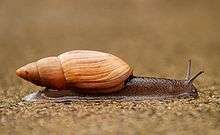Euglandina rosea
| Euglandina rosea | |
|---|---|
 | |
| Euglandina rosea from Kauai in Hawaii | |
| Scientific classification | |
| Kingdom: | Animalia |
| Phylum: | Mollusca |
| Class: | Gastropoda |
| (unranked): | clade Heterobranchia clade Euthyneura |
| Family: | Spiraxidae |
| Genus: | Euglandina |
| Species: | E. rosea |
| Binomial name | |
| Euglandina rosea (Férussac, 1821) | |
Euglandina rosea, common names the rosy wolfsnail or the cannibal snail, is a species of medium-sized to large predatory air-breathing land snail, a carnivorous terrestrial pulmonate gastropod mollusk in the family Spiraxidae.
Distribution

This species is native to Central America.[1] It has become an invasive species in many other places, including Hawaii.
These predatory snails were originally introduced to Hawaii in an attempt to eliminate another invasive species, the giant African land snail, Achatina fulica. However, the introduced species also vigorously attacked the indigenous O'ahu tree snail. As a result many tree snail species were hunted to extinction within the first year. These predatory snails continue to represent a threat to the local snail fauna. Of all known mollusk extinctions since the year 1500, about 70% are from islands, and it has been estimated that one-third of these were caused by introduced Euglandina rosea.[2]
Description
The rosy wolfsnail has a light brown elongated shell and a light grey, or brown body. Its lower tentacles are long and almost touch the ground. The shell is often 40 to 50 mm in maximum dimension but can sometimes be as large as 60 or even 70 mm.[3]
Feeding habits
This species is a fast and voracious predator, hunting and eating other snails and slugs. The smaller species of prey are ingested whole. This gave it the nickname "the cannibal snail".
References
- ↑ Kolbert, Elizabeth. (2014). The Sixth Extinction: An Unnatural History. New York: Henry Holt and Company, LLC.
- ↑ Claire Régnier, Benoît Fontaine & Philippe Bouchet (2009). "Not knowing, not recording, not listing: numerous unnoticed mollusk extinctions". Conservation Biology. 23 (5): 1214–1221. doi:10.1111/j.1523-1739.2009.01245.x. PMID 19459894.
- ↑ Kurt Auffenberg & Lionel A. Stange (November 2001). "Snail-eating snails of Florida, Gastropoda". University of Florida. EENY251. Retrieved October 7, 2012.
External links
| Wikimedia Commons has media related to Euglandina rosea. |
- Featured Creatures website': Euglandina rosea — University of Florida, Institute of Food and Agricultural Sciences—IFAS.
- Invasion Biology Introduced Species Summary Project — Columbia University
- Euglandina and Partula - biology and news
